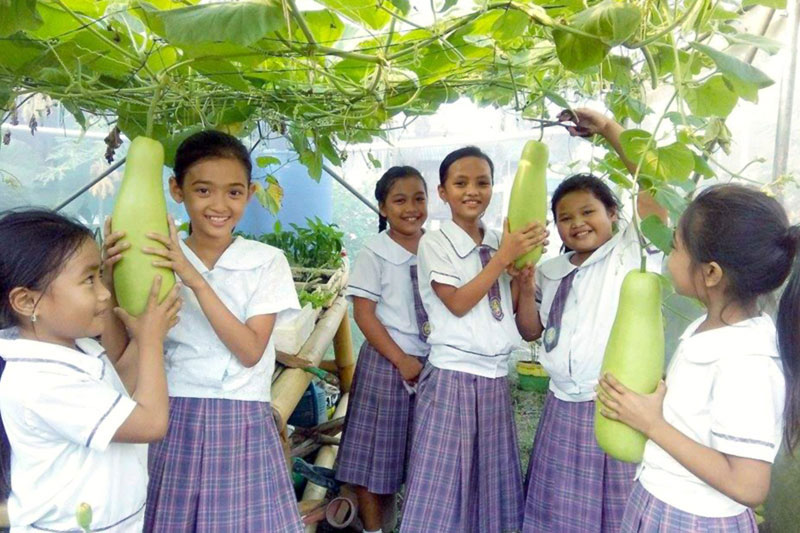Gardening program for public schools struggling with sustainability issues

A SCHOOL gardening program dating to 2007 is limping along with problems ranging from lack of space to inadequate irrigation, an agriculture official said.
Jose Diego E. Roxas, spokesperson for the Department of Agriculture’s (DA) Bureau of Plant Industry, the program’s seed supplier, said in a Viber message that the uneven growing conditions depending on the location could be discouraging to teachers and students seeking to maintain the school’s gulayan (vegetable patch).
He called for urban gardening to be incorporated into the school curriculum as a means of ensuring greater commitment to maintaining the gardens.
“Regular training should also be held to make sure that teachers are technically competent to teach and aid in maintaining their respective gulayans.”
The initiative, known as the Gulayan sa Paaralan Program (GPP), was launched in 2007 by the Department of Education (DepEd), in partnership with the (DA). It encouraged the cultivation of elementary and secondary public school gardens to supply school feeding programs.
The percentage of schools with gardens has actually increased to 81% (across 38,383 schools) in the 2020-2021 school year, up from 59% (27,898 schools) in 2015-2016, according to an April 24 presentation by Dexter A. Galban, assistant secretary for operations at the DepEd.
Interest in the school gardens had been stoked in recent years by an organic farming advocacy, Mr. Galban said in an e-mail.
He said the main obstacles to production are poor soil quality, access to water, and lack of interest in a number of locations.
“GPP is the lowest-priority program in some schools,” he told BusinessWorld.
He said the program’s champions include Dipolog City’s Project GREEN (Gardening as Recreation to Engage and Enhance Nutrition), which was created to sustain GPP during the pandemic, and which distributes seeds to learners for planting at home. Antique Province’s programs, known as Project PM mo ako and ProCam teach students backyard planting.
The success of a school garden depends on the commitment of the school head, as well as the GPP point person at each school, who needs to have a good grasp of gardening, according to Ma. Elena P. van Tooren, executive director of the East-West Seed Foundation, Inc. The foundation has trained DepEd personnel and students from 2,354 schools as of 2022.
“It is one thing to establish a vegetable garden; it’s another thing to sustain it and get the most out of it. Vegetable production is a science,” she said in an e-mail. Plant nutrition and integrated pest management are necessary for sustainability, she added.
“Your soil may be good at the start, but you have to keep augmenting and amending to continuously feed the plants over many crop cycles,” she told BusinessWorld. “Pests will inevitably want to feed on your plants, and they have their favorite varieties. There is a choice of management methods.”
SCHOOL-BASED FEEDING
The DepEd’s school-based feeding program (SBFP), which runs 120 days a year, is supplied in part by produce grown by the GPPs.
The Philippines has one of the highest rates of child stunting in the East Asia and Pacific Region, ranking fifth in a World Bank study. It is among the top 10 globally in terms of number of children affected by stunting.
“We do an assessment of the BMIs (body measurement index) of learners a week after class starts,” according to Joel V. Cruz, senior education program specialist for Social Mobilization and Networking at DepEd Nueva Ecija. “In August, we’ll be having an assessment of the weights and heights of the learners to determine who needs supplemental feeding.”
The 120-day feeding program is extended by some LGUs if they have the funding, he added.
“Our schools also partner with companies and agencies to continue the program for longer, especially in schools with IPs (indigenous peoples),” he said by phone.
Children are taught vegetable planting in an age-appropriate manner, he told BusinessWorld. In the lower elementary levels, the focus is on the familiarization with the different types of vegetable. Those in the fifth-grade level and above participate in activities like cooking contests and food processing.
“We also teach (high schoolers) how to add malunggay (moringa) when baking bread,” Mr. Cruz said. “There are various ways of teaching students to appreciate the value of planting vegetables.”
He added that, per a 2023 memorandum, the GSP will be handled henceforth by DepEd’s Health and Nutrition Unit.
Ms. Van Tooren said that both the DA and the DepEd have done a lot for the GPP. To address nutrition, she recommended interventions for the days that aren’t covered by the SBFP, including training parents on what to feed their children.
“A kamote (sweet potato) stalk or malunggay branch is all that is needed to start a simple home garden,” she said. — Patricia B. Mirasol



